Business Law and Ethics Essay: Contract Formation, Rights, and Duties
VerifiedAdded on 2022/12/28
|8
|2160
|99
Essay
AI Summary
This essay delves into the core principles of business law and ethics, emphasizing the formation of contracts and the associated legal rights and responsibilities. The essay begins with an introduction to commercial law, contract law, and business ethics, highlighting their importance in regulating business behavior and preventing legal consequences. The main body presents a case study involving a contract dispute, analyzing the elements of a valid contract, including offer, acceptance, and consideration. It examines the application of contract law principles in the context of the given scenario. The essay also explores the rights and responsibilities arising from contractual relationships, such as the right to fair dealing, timely consideration, and the duty to fulfill obligations. The essay concludes by summarizing the essential elements required for valid contract formation and underscores the significance of adhering to contractual obligations and the legal framework governing these relationships. The essay references various books and journals to support its arguments.
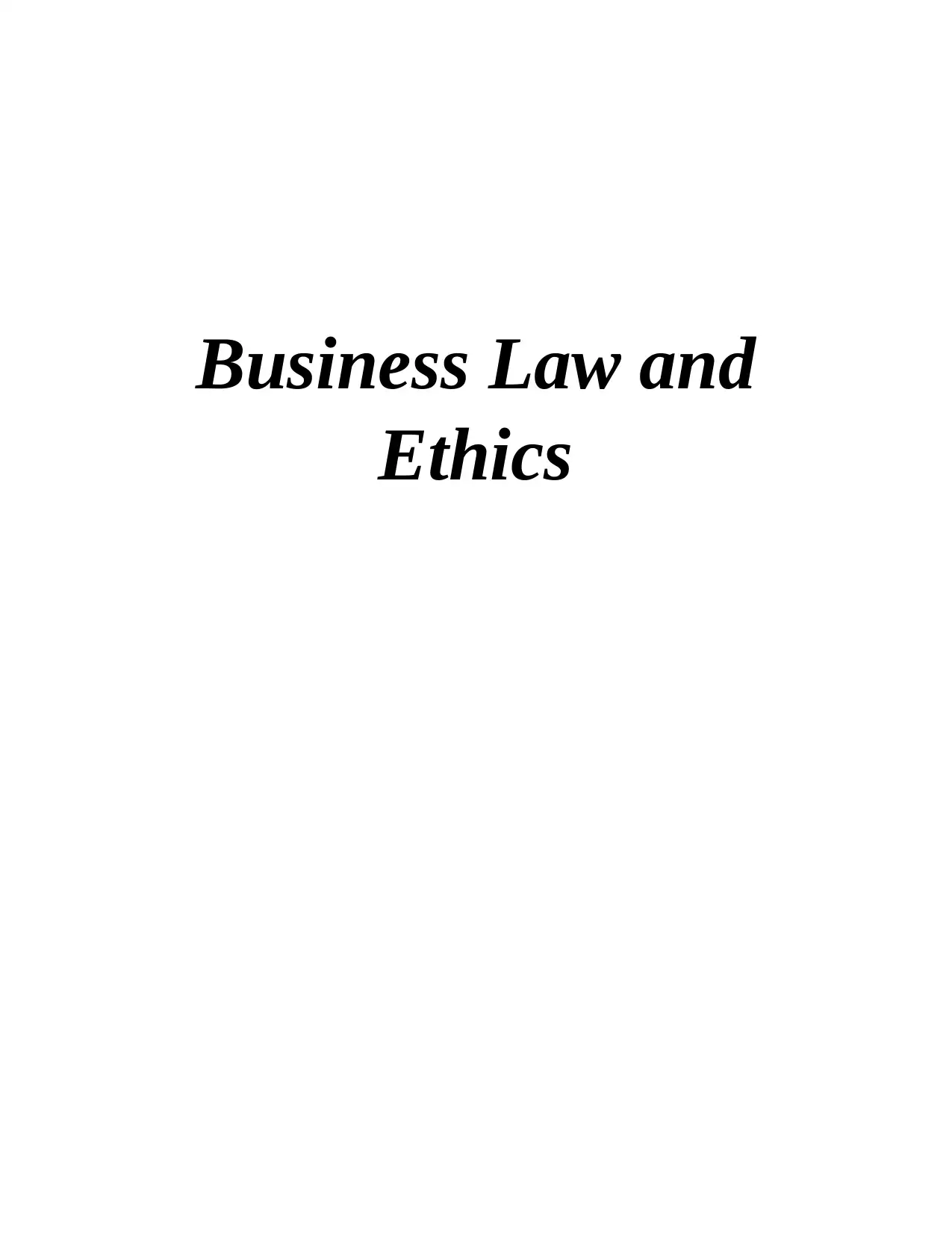
Business Law and
Ethics
Ethics
Paraphrase This Document
Need a fresh take? Get an instant paraphrase of this document with our AI Paraphraser

Contents
INTRODUCTION...........................................................................................................................................3
MAIN BODY.................................................................................................................................................3
CONCLUSION...............................................................................................................................................5
REFERENCES................................................................................................................................................5
INTRODUCTION...........................................................................................................................................3
MAIN BODY.................................................................................................................................................3
CONCLUSION...............................................................................................................................................5
REFERENCES................................................................................................................................................5
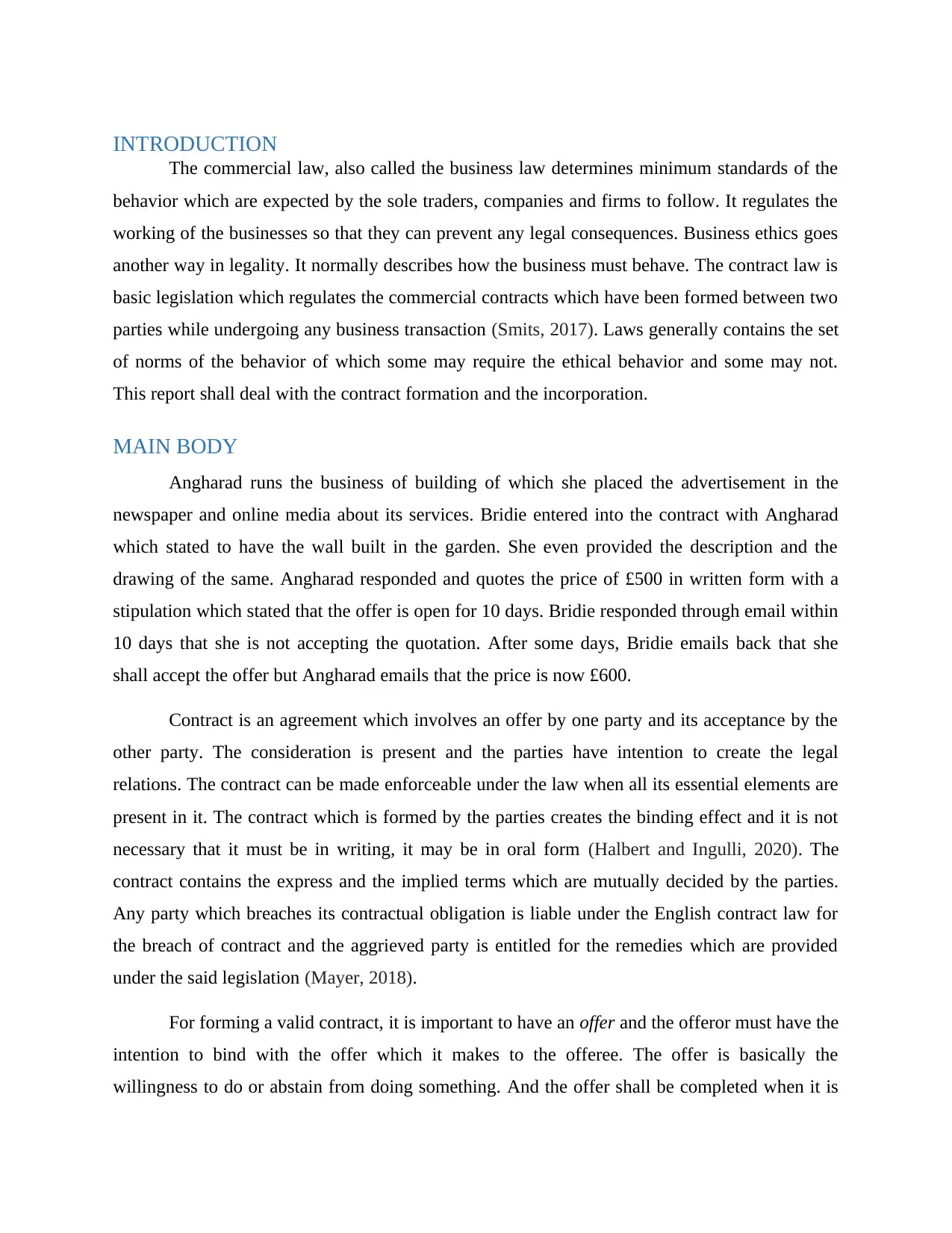
INTRODUCTION
The commercial law, also called the business law determines minimum standards of the
behavior which are expected by the sole traders, companies and firms to follow. It regulates the
working of the businesses so that they can prevent any legal consequences. Business ethics goes
another way in legality. It normally describes how the business must behave. The contract law is
basic legislation which regulates the commercial contracts which have been formed between two
parties while undergoing any business transaction (Smits, 2017). Laws generally contains the set
of norms of the behavior of which some may require the ethical behavior and some may not.
This report shall deal with the contract formation and the incorporation.
MAIN BODY
Angharad runs the business of building of which she placed the advertisement in the
newspaper and online media about its services. Bridie entered into the contract with Angharad
which stated to have the wall built in the garden. She even provided the description and the
drawing of the same. Angharad responded and quotes the price of £500 in written form with a
stipulation which stated that the offer is open for 10 days. Bridie responded through email within
10 days that she is not accepting the quotation. After some days, Bridie emails back that she
shall accept the offer but Angharad emails that the price is now £600.
Contract is an agreement which involves an offer by one party and its acceptance by the
other party. The consideration is present and the parties have intention to create the legal
relations. The contract can be made enforceable under the law when all its essential elements are
present in it. The contract which is formed by the parties creates the binding effect and it is not
necessary that it must be in writing, it may be in oral form (Halbert and Ingulli, 2020). The
contract contains the express and the implied terms which are mutually decided by the parties.
Any party which breaches its contractual obligation is liable under the English contract law for
the breach of contract and the aggrieved party is entitled for the remedies which are provided
under the said legislation (Mayer, 2018).
For forming a valid contract, it is important to have an offer and the offeror must have the
intention to bind with the offer which it makes to the offeree. The offer is basically the
willingness to do or abstain from doing something. And the offer shall be completed when it is
The commercial law, also called the business law determines minimum standards of the
behavior which are expected by the sole traders, companies and firms to follow. It regulates the
working of the businesses so that they can prevent any legal consequences. Business ethics goes
another way in legality. It normally describes how the business must behave. The contract law is
basic legislation which regulates the commercial contracts which have been formed between two
parties while undergoing any business transaction (Smits, 2017). Laws generally contains the set
of norms of the behavior of which some may require the ethical behavior and some may not.
This report shall deal with the contract formation and the incorporation.
MAIN BODY
Angharad runs the business of building of which she placed the advertisement in the
newspaper and online media about its services. Bridie entered into the contract with Angharad
which stated to have the wall built in the garden. She even provided the description and the
drawing of the same. Angharad responded and quotes the price of £500 in written form with a
stipulation which stated that the offer is open for 10 days. Bridie responded through email within
10 days that she is not accepting the quotation. After some days, Bridie emails back that she
shall accept the offer but Angharad emails that the price is now £600.
Contract is an agreement which involves an offer by one party and its acceptance by the
other party. The consideration is present and the parties have intention to create the legal
relations. The contract can be made enforceable under the law when all its essential elements are
present in it. The contract which is formed by the parties creates the binding effect and it is not
necessary that it must be in writing, it may be in oral form (Halbert and Ingulli, 2020). The
contract contains the express and the implied terms which are mutually decided by the parties.
Any party which breaches its contractual obligation is liable under the English contract law for
the breach of contract and the aggrieved party is entitled for the remedies which are provided
under the said legislation (Mayer, 2018).
For forming a valid contract, it is important to have an offer and the offeror must have the
intention to bind with the offer which it makes to the offeree. The offer is basically the
willingness to do or abstain from doing something. And the offer shall be completed when it is
⊘ This is a preview!⊘
Do you want full access?
Subscribe today to unlock all pages.

Trusted by 1+ million students worldwide
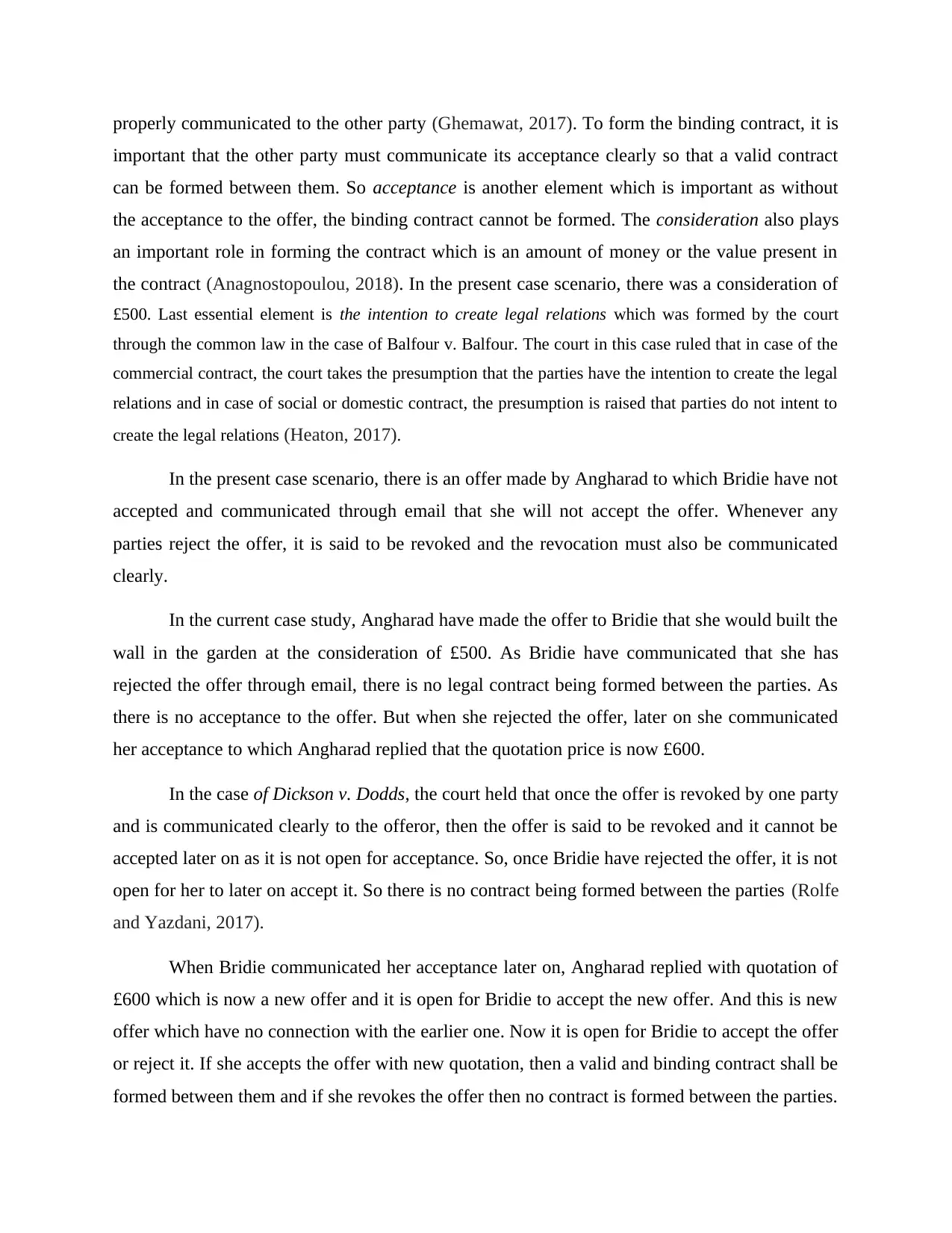
properly communicated to the other party (Ghemawat, 2017). To form the binding contract, it is
important that the other party must communicate its acceptance clearly so that a valid contract
can be formed between them. So acceptance is another element which is important as without
the acceptance to the offer, the binding contract cannot be formed. The consideration also plays
an important role in forming the contract which is an amount of money or the value present in
the contract (Anagnostopoulou, 2018). In the present case scenario, there was a consideration of
£500. Last essential element is the intention to create legal relations which was formed by the court
through the common law in the case of Balfour v. Balfour. The court in this case ruled that in case of the
commercial contract, the court takes the presumption that the parties have the intention to create the legal
relations and in case of social or domestic contract, the presumption is raised that parties do not intent to
create the legal relations (Heaton, 2017).
In the present case scenario, there is an offer made by Angharad to which Bridie have not
accepted and communicated through email that she will not accept the offer. Whenever any
parties reject the offer, it is said to be revoked and the revocation must also be communicated
clearly.
In the current case study, Angharad have made the offer to Bridie that she would built the
wall in the garden at the consideration of £500. As Bridie have communicated that she has
rejected the offer through email, there is no legal contract being formed between the parties. As
there is no acceptance to the offer. But when she rejected the offer, later on she communicated
her acceptance to which Angharad replied that the quotation price is now £600.
In the case of Dickson v. Dodds, the court held that once the offer is revoked by one party
and is communicated clearly to the offeror, then the offer is said to be revoked and it cannot be
accepted later on as it is not open for acceptance. So, once Bridie have rejected the offer, it is not
open for her to later on accept it. So there is no contract being formed between the parties (Rolfe
and Yazdani, 2017).
When Bridie communicated her acceptance later on, Angharad replied with quotation of
£600 which is now a new offer and it is open for Bridie to accept the new offer. And this is new
offer which have no connection with the earlier one. Now it is open for Bridie to accept the offer
or reject it. If she accepts the offer with new quotation, then a valid and binding contract shall be
formed between them and if she revokes the offer then no contract is formed between the parties.
important that the other party must communicate its acceptance clearly so that a valid contract
can be formed between them. So acceptance is another element which is important as without
the acceptance to the offer, the binding contract cannot be formed. The consideration also plays
an important role in forming the contract which is an amount of money or the value present in
the contract (Anagnostopoulou, 2018). In the present case scenario, there was a consideration of
£500. Last essential element is the intention to create legal relations which was formed by the court
through the common law in the case of Balfour v. Balfour. The court in this case ruled that in case of the
commercial contract, the court takes the presumption that the parties have the intention to create the legal
relations and in case of social or domestic contract, the presumption is raised that parties do not intent to
create the legal relations (Heaton, 2017).
In the present case scenario, there is an offer made by Angharad to which Bridie have not
accepted and communicated through email that she will not accept the offer. Whenever any
parties reject the offer, it is said to be revoked and the revocation must also be communicated
clearly.
In the current case study, Angharad have made the offer to Bridie that she would built the
wall in the garden at the consideration of £500. As Bridie have communicated that she has
rejected the offer through email, there is no legal contract being formed between the parties. As
there is no acceptance to the offer. But when she rejected the offer, later on she communicated
her acceptance to which Angharad replied that the quotation price is now £600.
In the case of Dickson v. Dodds, the court held that once the offer is revoked by one party
and is communicated clearly to the offeror, then the offer is said to be revoked and it cannot be
accepted later on as it is not open for acceptance. So, once Bridie have rejected the offer, it is not
open for her to later on accept it. So there is no contract being formed between the parties (Rolfe
and Yazdani, 2017).
When Bridie communicated her acceptance later on, Angharad replied with quotation of
£600 which is now a new offer and it is open for Bridie to accept the new offer. And this is new
offer which have no connection with the earlier one. Now it is open for Bridie to accept the offer
or reject it. If she accepts the offer with new quotation, then a valid and binding contract shall be
formed between them and if she revokes the offer then no contract is formed between the parties.
Paraphrase This Document
Need a fresh take? Get an instant paraphrase of this document with our AI Paraphraser
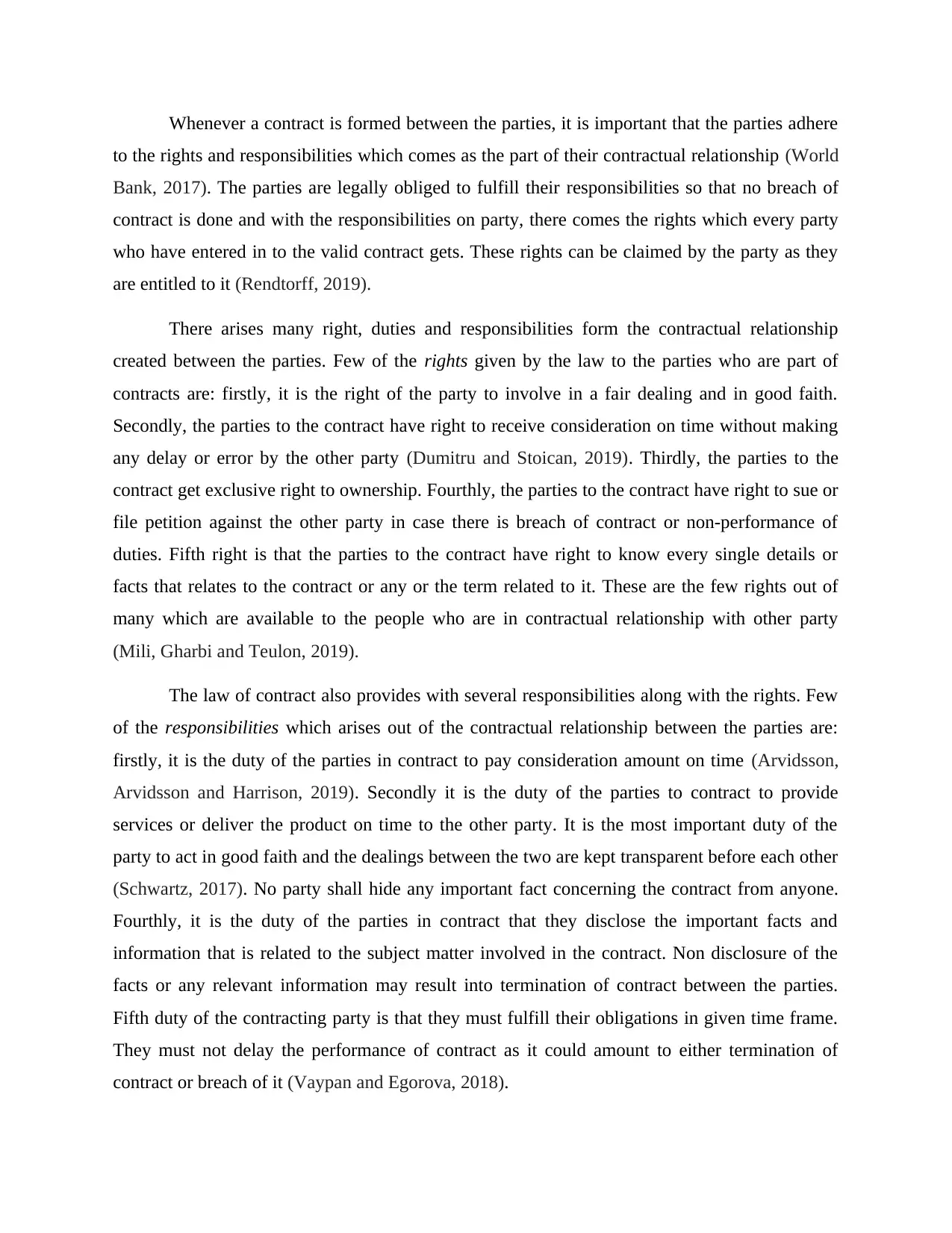
Whenever a contract is formed between the parties, it is important that the parties adhere
to the rights and responsibilities which comes as the part of their contractual relationship (World
Bank, 2017). The parties are legally obliged to fulfill their responsibilities so that no breach of
contract is done and with the responsibilities on party, there comes the rights which every party
who have entered in to the valid contract gets. These rights can be claimed by the party as they
are entitled to it (Rendtorff, 2019).
There arises many right, duties and responsibilities form the contractual relationship
created between the parties. Few of the rights given by the law to the parties who are part of
contracts are: firstly, it is the right of the party to involve in a fair dealing and in good faith.
Secondly, the parties to the contract have right to receive consideration on time without making
any delay or error by the other party (Dumitru and Stoican, 2019). Thirdly, the parties to the
contract get exclusive right to ownership. Fourthly, the parties to the contract have right to sue or
file petition against the other party in case there is breach of contract or non-performance of
duties. Fifth right is that the parties to the contract have right to know every single details or
facts that relates to the contract or any or the term related to it. These are the few rights out of
many which are available to the people who are in contractual relationship with other party
(Mili, Gharbi and Teulon, 2019).
The law of contract also provides with several responsibilities along with the rights. Few
of the responsibilities which arises out of the contractual relationship between the parties are:
firstly, it is the duty of the parties in contract to pay consideration amount on time (Arvidsson,
Arvidsson and Harrison, 2019). Secondly it is the duty of the parties to contract to provide
services or deliver the product on time to the other party. It is the most important duty of the
party to act in good faith and the dealings between the two are kept transparent before each other
(Schwartz, 2017). No party shall hide any important fact concerning the contract from anyone.
Fourthly, it is the duty of the parties in contract that they disclose the important facts and
information that is related to the subject matter involved in the contract. Non disclosure of the
facts or any relevant information may result into termination of contract between the parties.
Fifth duty of the contracting party is that they must fulfill their obligations in given time frame.
They must not delay the performance of contract as it could amount to either termination of
contract or breach of it (Vaypan and Egorova, 2018).
to the rights and responsibilities which comes as the part of their contractual relationship (World
Bank, 2017). The parties are legally obliged to fulfill their responsibilities so that no breach of
contract is done and with the responsibilities on party, there comes the rights which every party
who have entered in to the valid contract gets. These rights can be claimed by the party as they
are entitled to it (Rendtorff, 2019).
There arises many right, duties and responsibilities form the contractual relationship
created between the parties. Few of the rights given by the law to the parties who are part of
contracts are: firstly, it is the right of the party to involve in a fair dealing and in good faith.
Secondly, the parties to the contract have right to receive consideration on time without making
any delay or error by the other party (Dumitru and Stoican, 2019). Thirdly, the parties to the
contract get exclusive right to ownership. Fourthly, the parties to the contract have right to sue or
file petition against the other party in case there is breach of contract or non-performance of
duties. Fifth right is that the parties to the contract have right to know every single details or
facts that relates to the contract or any or the term related to it. These are the few rights out of
many which are available to the people who are in contractual relationship with other party
(Mili, Gharbi and Teulon, 2019).
The law of contract also provides with several responsibilities along with the rights. Few
of the responsibilities which arises out of the contractual relationship between the parties are:
firstly, it is the duty of the parties in contract to pay consideration amount on time (Arvidsson,
Arvidsson and Harrison, 2019). Secondly it is the duty of the parties to contract to provide
services or deliver the product on time to the other party. It is the most important duty of the
party to act in good faith and the dealings between the two are kept transparent before each other
(Schwartz, 2017). No party shall hide any important fact concerning the contract from anyone.
Fourthly, it is the duty of the parties in contract that they disclose the important facts and
information that is related to the subject matter involved in the contract. Non disclosure of the
facts or any relevant information may result into termination of contract between the parties.
Fifth duty of the contracting party is that they must fulfill their obligations in given time frame.
They must not delay the performance of contract as it could amount to either termination of
contract or breach of it (Vaypan and Egorova, 2018).
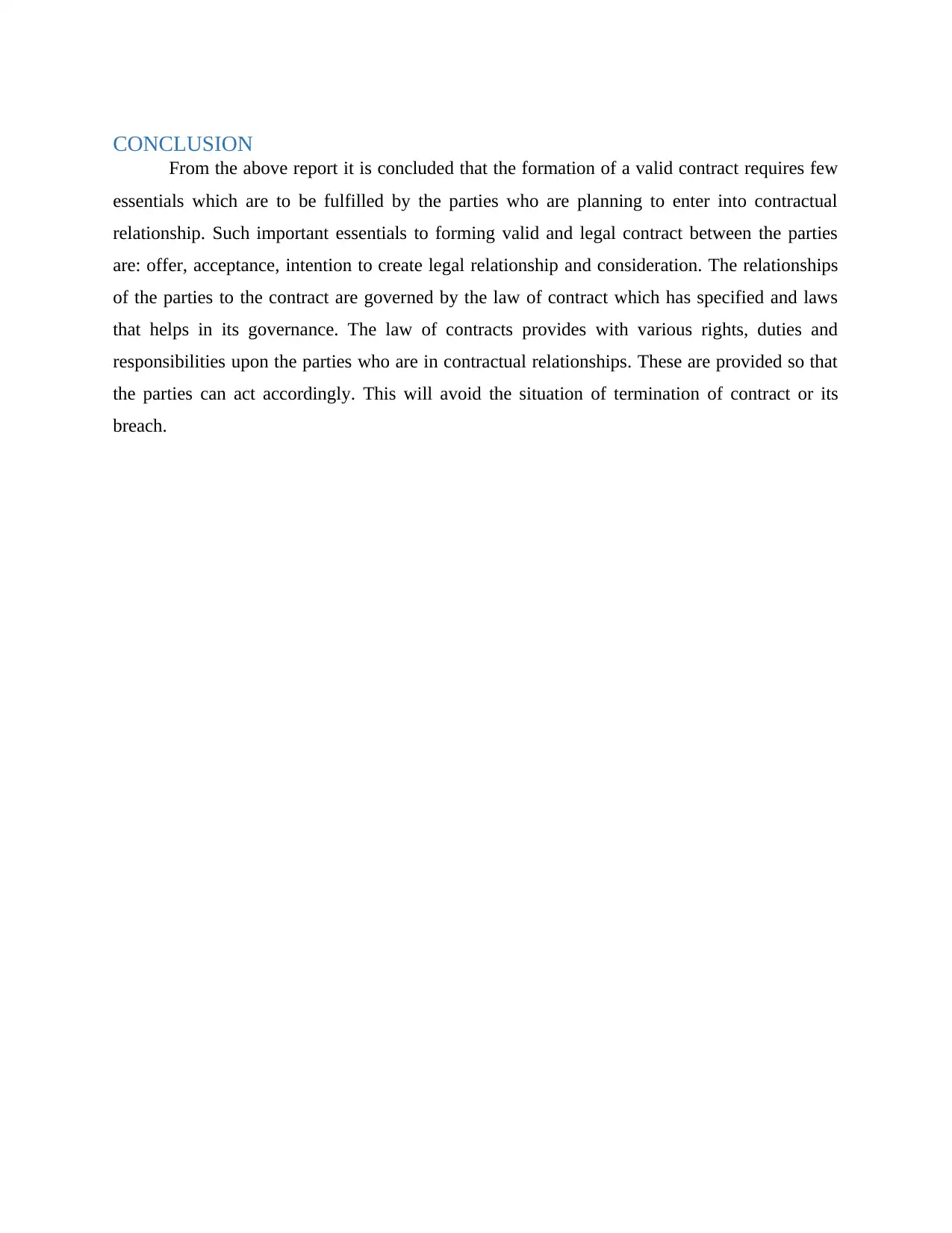
CONCLUSION
From the above report it is concluded that the formation of a valid contract requires few
essentials which are to be fulfilled by the parties who are planning to enter into contractual
relationship. Such important essentials to forming valid and legal contract between the parties
are: offer, acceptance, intention to create legal relationship and consideration. The relationships
of the parties to the contract are governed by the law of contract which has specified and laws
that helps in its governance. The law of contracts provides with various rights, duties and
responsibilities upon the parties who are in contractual relationships. These are provided so that
the parties can act accordingly. This will avoid the situation of termination of contract or its
breach.
From the above report it is concluded that the formation of a valid contract requires few
essentials which are to be fulfilled by the parties who are planning to enter into contractual
relationship. Such important essentials to forming valid and legal contract between the parties
are: offer, acceptance, intention to create legal relationship and consideration. The relationships
of the parties to the contract are governed by the law of contract which has specified and laws
that helps in its governance. The law of contracts provides with various rights, duties and
responsibilities upon the parties who are in contractual relationships. These are provided so that
the parties can act accordingly. This will avoid the situation of termination of contract or its
breach.
⊘ This is a preview!⊘
Do you want full access?
Subscribe today to unlock all pages.

Trusted by 1+ million students worldwide
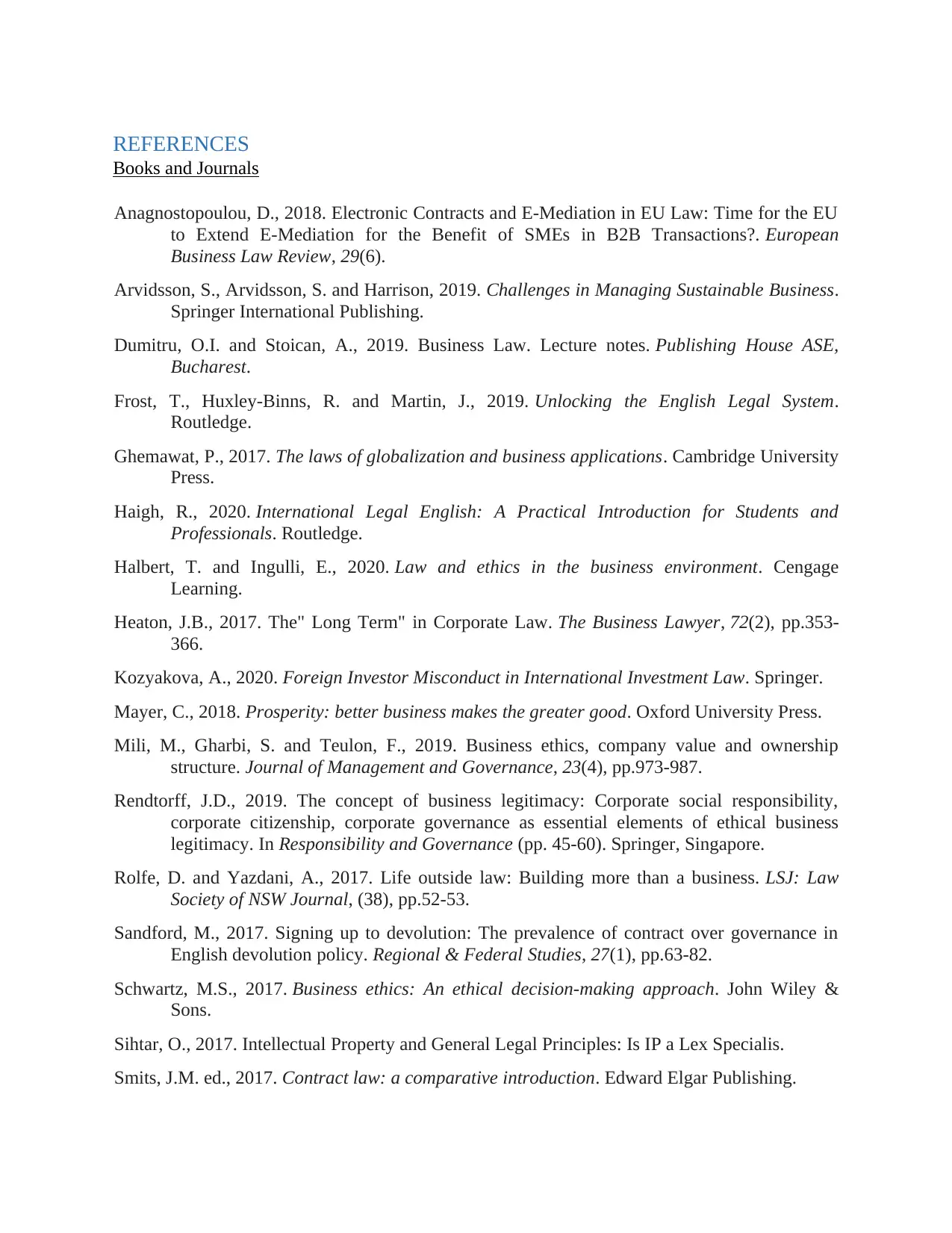
REFERENCES
Books and Journals
Anagnostopoulou, D., 2018. Electronic Contracts and E-Mediation in EU Law: Time for the EU
to Extend E-Mediation for the Benefit of SMEs in B2B Transactions?. European
Business Law Review, 29(6).
Arvidsson, S., Arvidsson, S. and Harrison, 2019. Challenges in Managing Sustainable Business.
Springer International Publishing.
Dumitru, O.I. and Stoican, A., 2019. Business Law. Lecture notes. Publishing House ASE,
Bucharest.
Frost, T., Huxley-Binns, R. and Martin, J., 2019. Unlocking the English Legal System.
Routledge.
Ghemawat, P., 2017. The laws of globalization and business applications. Cambridge University
Press.
Haigh, R., 2020. International Legal English: A Practical Introduction for Students and
Professionals. Routledge.
Halbert, T. and Ingulli, E., 2020. Law and ethics in the business environment. Cengage
Learning.
Heaton, J.B., 2017. The" Long Term" in Corporate Law. The Business Lawyer, 72(2), pp.353-
366.
Kozyakova, A., 2020. Foreign Investor Misconduct in International Investment Law. Springer.
Mayer, C., 2018. Prosperity: better business makes the greater good. Oxford University Press.
Mili, M., Gharbi, S. and Teulon, F., 2019. Business ethics, company value and ownership
structure. Journal of Management and Governance, 23(4), pp.973-987.
Rendtorff, J.D., 2019. The concept of business legitimacy: Corporate social responsibility,
corporate citizenship, corporate governance as essential elements of ethical business
legitimacy. In Responsibility and Governance (pp. 45-60). Springer, Singapore.
Rolfe, D. and Yazdani, A., 2017. Life outside law: Building more than a business. LSJ: Law
Society of NSW Journal, (38), pp.52-53.
Sandford, M., 2017. Signing up to devolution: The prevalence of contract over governance in
English devolution policy. Regional & Federal Studies, 27(1), pp.63-82.
Schwartz, M.S., 2017. Business ethics: An ethical decision-making approach. John Wiley &
Sons.
Sihtar, O., 2017. Intellectual Property and General Legal Principles: Is IP a Lex Specialis.
Smits, J.M. ed., 2017. Contract law: a comparative introduction. Edward Elgar Publishing.
Books and Journals
Anagnostopoulou, D., 2018. Electronic Contracts and E-Mediation in EU Law: Time for the EU
to Extend E-Mediation for the Benefit of SMEs in B2B Transactions?. European
Business Law Review, 29(6).
Arvidsson, S., Arvidsson, S. and Harrison, 2019. Challenges in Managing Sustainable Business.
Springer International Publishing.
Dumitru, O.I. and Stoican, A., 2019. Business Law. Lecture notes. Publishing House ASE,
Bucharest.
Frost, T., Huxley-Binns, R. and Martin, J., 2019. Unlocking the English Legal System.
Routledge.
Ghemawat, P., 2017. The laws of globalization and business applications. Cambridge University
Press.
Haigh, R., 2020. International Legal English: A Practical Introduction for Students and
Professionals. Routledge.
Halbert, T. and Ingulli, E., 2020. Law and ethics in the business environment. Cengage
Learning.
Heaton, J.B., 2017. The" Long Term" in Corporate Law. The Business Lawyer, 72(2), pp.353-
366.
Kozyakova, A., 2020. Foreign Investor Misconduct in International Investment Law. Springer.
Mayer, C., 2018. Prosperity: better business makes the greater good. Oxford University Press.
Mili, M., Gharbi, S. and Teulon, F., 2019. Business ethics, company value and ownership
structure. Journal of Management and Governance, 23(4), pp.973-987.
Rendtorff, J.D., 2019. The concept of business legitimacy: Corporate social responsibility,
corporate citizenship, corporate governance as essential elements of ethical business
legitimacy. In Responsibility and Governance (pp. 45-60). Springer, Singapore.
Rolfe, D. and Yazdani, A., 2017. Life outside law: Building more than a business. LSJ: Law
Society of NSW Journal, (38), pp.52-53.
Sandford, M., 2017. Signing up to devolution: The prevalence of contract over governance in
English devolution policy. Regional & Federal Studies, 27(1), pp.63-82.
Schwartz, M.S., 2017. Business ethics: An ethical decision-making approach. John Wiley &
Sons.
Sihtar, O., 2017. Intellectual Property and General Legal Principles: Is IP a Lex Specialis.
Smits, J.M. ed., 2017. Contract law: a comparative introduction. Edward Elgar Publishing.
Paraphrase This Document
Need a fresh take? Get an instant paraphrase of this document with our AI Paraphraser
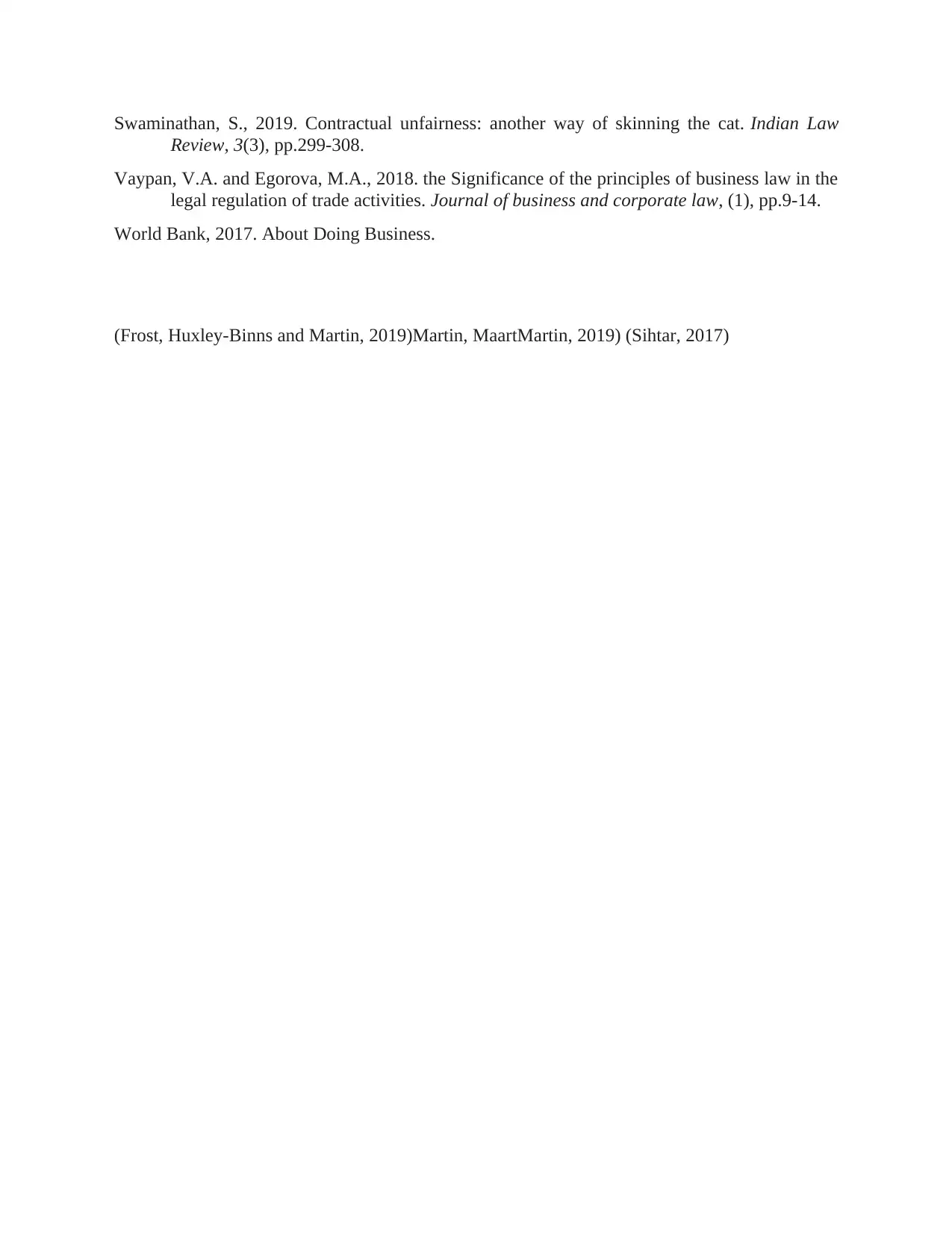
Swaminathan, S., 2019. Contractual unfairness: another way of skinning the cat. Indian Law
Review, 3(3), pp.299-308.
Vaypan, V.A. and Egorova, M.A., 2018. the Significance of the principles of business law in the
legal regulation of trade activities. Journal of business and corporate law, (1), pp.9-14.
World Bank, 2017. About Doing Business.
(Frost, Huxley-Binns and Martin, 2019)Martin, MaartMartin, 2019) (Sihtar, 2017)
Review, 3(3), pp.299-308.
Vaypan, V.A. and Egorova, M.A., 2018. the Significance of the principles of business law in the
legal regulation of trade activities. Journal of business and corporate law, (1), pp.9-14.
World Bank, 2017. About Doing Business.
(Frost, Huxley-Binns and Martin, 2019)Martin, MaartMartin, 2019) (Sihtar, 2017)
1 out of 8
Related Documents
Your All-in-One AI-Powered Toolkit for Academic Success.
+13062052269
info@desklib.com
Available 24*7 on WhatsApp / Email
![[object Object]](/_next/static/media/star-bottom.7253800d.svg)
Unlock your academic potential
Copyright © 2020–2026 A2Z Services. All Rights Reserved. Developed and managed by ZUCOL.





